Tackling Algorithm Chaos: Proactive Measures by Leading Platforms, Ambiguity from Others
![]() 01/09 2025
01/09 2025
![]() 506
506
The chaos surrounding algorithms on internet platforms necessitates prompt and appropriate rectification.
British scholar Scott Lash noted, "In a society where media and algorithms are pervasive, power increasingly resides within algorithms."
While algorithms, leveraging big data and artificial intelligence technology, bring significant economic and societal benefits, some platforms and businesses inevitably misuse them for improper gain. This has led to the creation of "information silos," the implementation of big data "price discrimination" strategies, and the precise targeting of commercial advertisements to different groups for "grassroots marketing."
On November 24, 2024, the Cyberspace Administration of China issued the "Notice on the Special Action of 'Clearing Up and Brightening: Governance of Typical Issues Related to Algorithms on Network Platforms,'" proposing to focus on rectifying key issues such as homogeneous content pushes creating "information silos," illegally manipulating and intervening in rankings to hype hot topics, blindly pursuing profits at the expense of new-form employment workers' rights, using algorithms to implement big data "price discrimination," and the lack of upward and benevolent algorithm services infringing on users' legitimate rights and interests. This special action will continue until February 14 of this year.
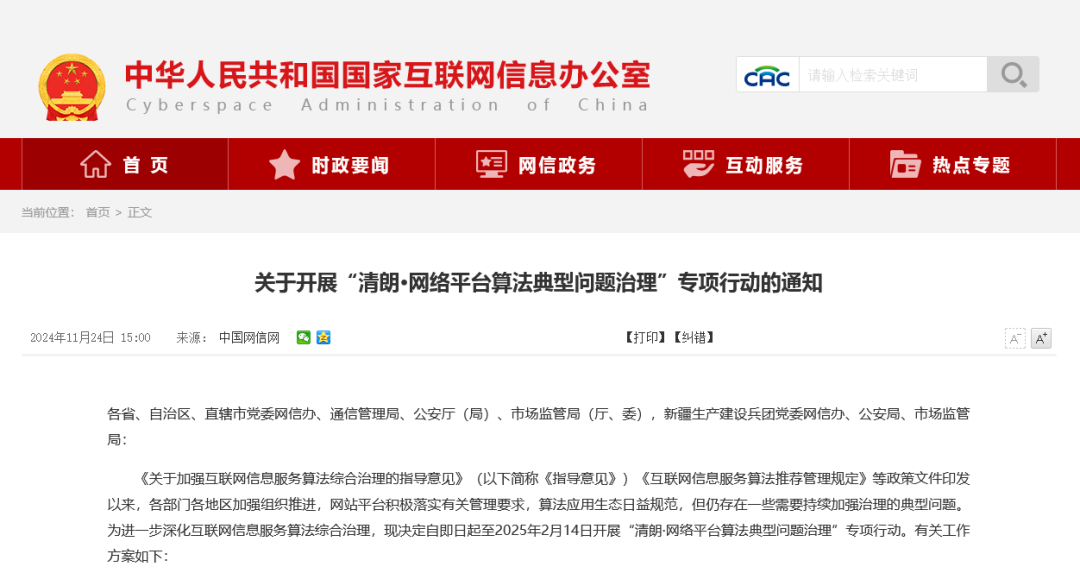
In December 2024, the Beijing Municipal Commission of the CPC Municipal Committee for Cyberspace Affairs urged and guided 11 key local network platforms to take the lead in conducting self-examination and self-correction, with tailored research discussions and guidance for enterprises like Meituan, Didi, and Baidu.
On December 27, the official account "Cyberspace Shanghai" published an article stating that, in accordance with the joint deployment of the Central Cyberspace Administration Office and three other departments, the Shanghai Municipal Commission of the CPC Municipal Committee for Cyberspace Affairs, alongside the Municipal Communications Administration, the Municipal Public Security Bureau, and the Municipal Market Supervision Bureau, promoted the special action of "Clearing Up and Brightening Pujiang: Governance of Typical Issues Related to Algorithms on Network Platforms." This required local website platforms in Shanghai to self-examine and self-correct on issues such as "information silos," manipulating rankings to hype hot topics, infringing on the rights and interests of new-form employment workers, big data "price discrimination," and the lack of upward and benevolent algorithm services.
Platforms such as Pinduoduo, Xiaohongshu, Ctrip, Bilibili, Depp, Himalaya, Eleme, Dianping, and Dingdong Maicai have successively issued governance announcements for the special action of "Clearing Up and Brightening Pujiang: Governance of Typical Issues Related to Algorithms on Network Platforms."
In 2025, the governance of platform algorithms has become a compulsory course for internet enterprises.
01 Rectification of Algorithm Chaos
Douyin, Meituan, Pinduoduo, Xiaohongshu, and Weibo Take "Practical" Actions
Against this backdrop, on December 27, Meituan announced eight measures to promote correct algorithm orientation. These include promoting open and diverse algorithm mechanisms, further enhancing rider fatigue prevention and incentive mechanisms, and optimizing rider delivery environment and safety issues.
Meituan stated that, building on previous algorithm disclosures, it will establish a dedicated area for algorithm publicity to foster fairer, more transparent, and humane algorithms. By introducing alternative solutions such as training and a points system, Meituan aims to gradually eliminate rider overtime deductions by the end of 2025, shifting from negative penalties to positive incentives.

Previously, Meituan launched a pilot project in multiple regions requiring riders to log out for mandatory rest. This project aims to remind riders to pause work for necessary rest when the system detects continuous work beyond specified hours. If riders ignore the rest reminder and continue working, the platform automatically logs them out.
On December 20, Meituan's official Weibo account published data and survey results on the rider "anti-fatigue pilot" program. Among them, the average daily delivery time for normal riders in Jiangsu, Zhejiang, Shanghai, and Fujian is 5-6 hours, with 99.82% of normal riders unaffected and only 0.18% of riders triggering rest clauses due to continuous delivery.
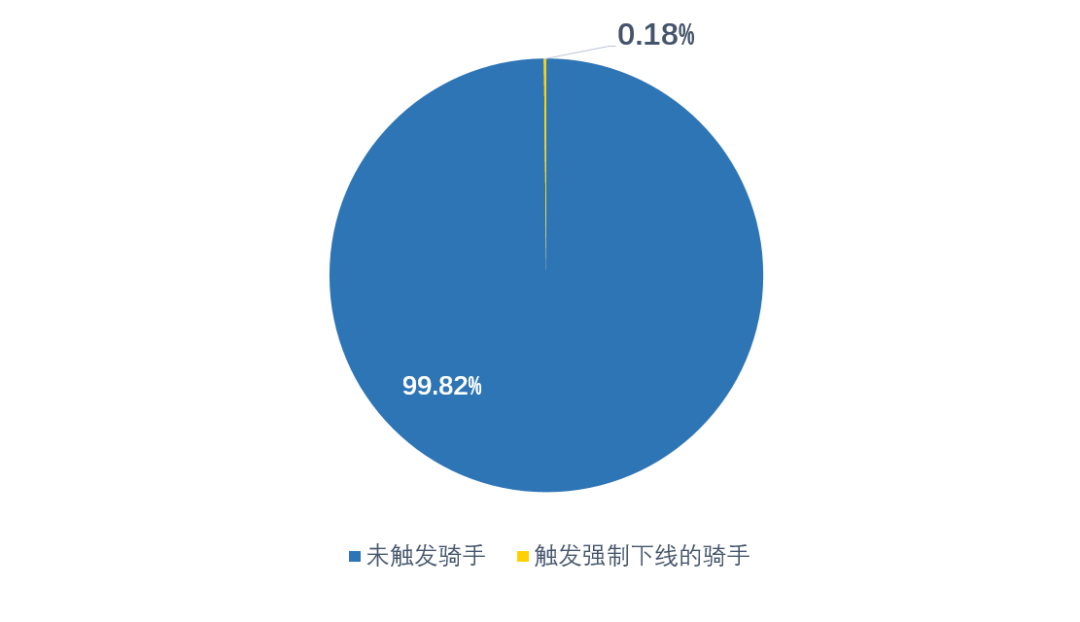
Regarding the pilot of this new strategy, most riders expressed support on social platforms, believing that the mandatory rest rule makes the distribution of riders' orders and rights and interests more equitable. However, some riders argue that "working too long can be risky, but some people have to work longer hours to support their families. The platform can remind them to rest, but forcing them to log out may push them to switch to other platforms, which is only a temporary solution."
On January 3, Xiaohongshu announced via its official account "Shu Guanjia" that users can understand the operating principles of the personalized recommendation algorithm under "Privacy Settings" and "Personalized Options" within the Xiaohongshu APP and can independently turn on or off the personalized recommendation function. If users wish to increase or filter specific category tag content, they can access the function page for independent adjustment through "Settings" - "Content Preference Adjustment" in the Xiaohongshu APP.

On the same day, Douyin announced it would launch ten measures to optimize platform algorithms. It will build a Safety and Trust Center website and offline exhibition hall in 2025 to publicly disclose the calculation principles and mechanisms of various hot topic rankings and regularly disclose typical violations and phenomena in platform governance, launching special services for infringement issues.
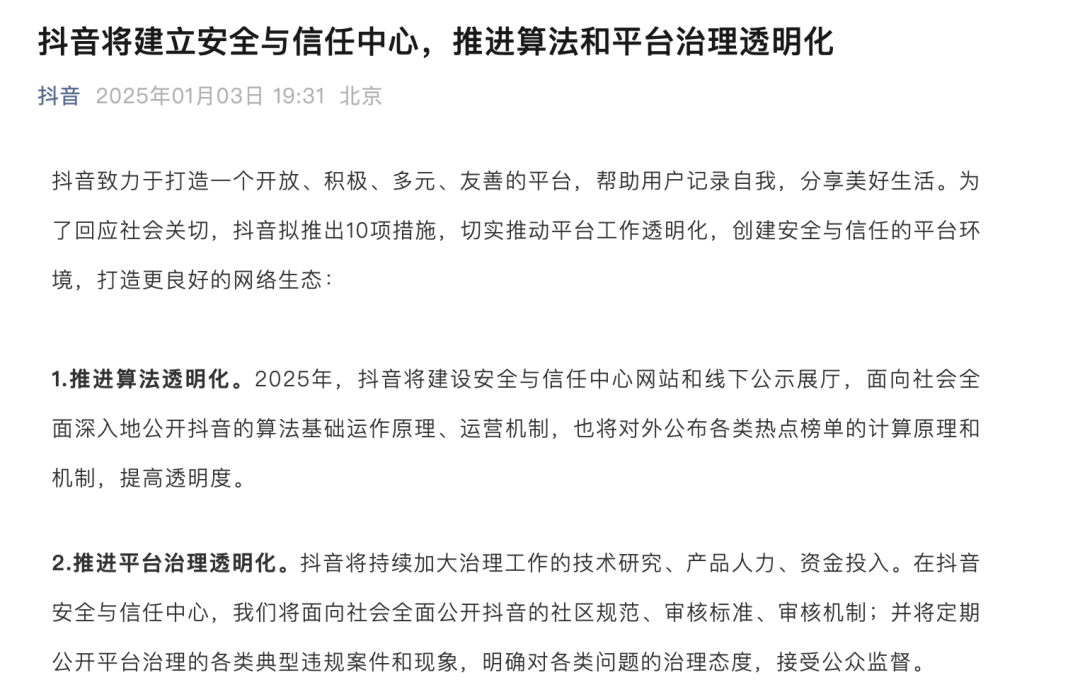
It will also further bolster support mechanisms for high-quality content, separately launching the "Douyin Selection" app and "Selection" channel to provide high-quality services and continuously improve recommendation algorithms to break down "information silos."
Over the past year, Douyin has taken multiple measures to strengthen platform governance, such as announcing the implementation of a hot content verification mechanism. For users speaking out as involved parties in hot events on Douyin, the platform will contact them for identity verification. Regarding accounts that teach illegal "operational skills" and "account creation guides" polluting the algorithm upstream, it will guide users to clean up accounts and videos publishing "homogeneous" content, "unscrupulously riding social hot topics," "violating public order and good customs to create personas," and "self-directed and fake content."
On January 4, Weibo proposed seven specific measures to comprehensively strengthen the optimization of institutional processes for key aspects such as platform trending search algorithm and content governance.
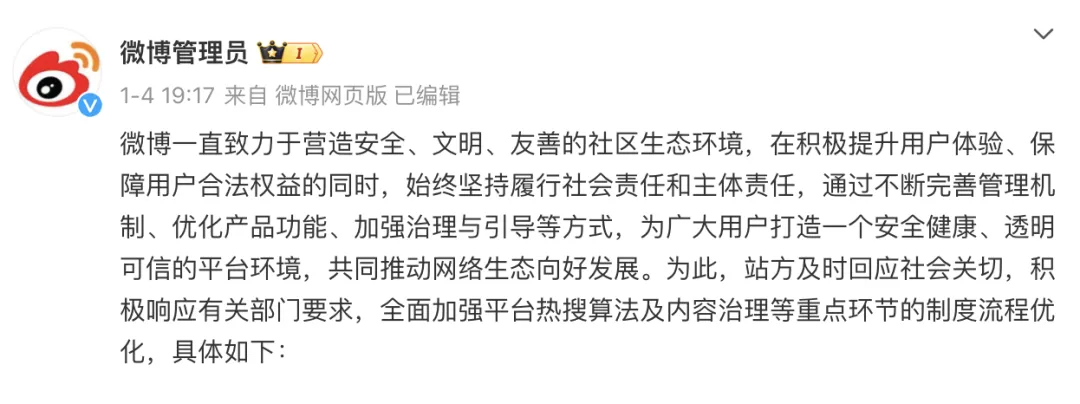
It mentioned that Weibo will add concise and intuitive explanation tags to the top 50 trending words on the trending search list, displaying the popularity source and ranking reasons for each trending word. It will also add more trending search entries and complaint categories related to content.
In addition, Weibo's adjustments include: avoiding the breeding and spread of extreme speech and confrontational emotions; increasing channels for presenting rumor refutation content, strengthening the application of rumor refutation features such as small yellow tags, small blue tags, and "Weibo annotations"; adding a "community convention warning" mechanism, and comprehensively upgrading the display form of community rules.
Currently, Weibo's trending search rules have undergone two major rectifications.
The first was in January 2018, when Weibo was summoned by the Beijing Municipal Commission of the CPC Municipal Committee for Cyberspace Affairs due to the trending search "Ziguangge Drain Oil" manipulated by PG One fans. Since then, for a topic to appear on the trending search list, it not only requires a high search frequency but also comprehensive consideration of its spread, user interaction levels, and topic discussion heat. Moreover, the generation of the trending search list no longer relies entirely on automatic algorithm sorting, incorporating a manual review and editing process.
The second was in June 2020, when Weibo was accused of interfering with the normal dissemination of online information in the Alibaba Jiang Fan incident. In response, the trending search system underwent a second major upgrade, introducing new evaluation indicators such as discussion heat, strengthening the identification mechanism for water army behavior, and publicly explaining the principles of algorithm sorting for the first time. Since this upgrade, there have been no significant adjustments to Weibo's algorithm rules.
Pinduoduo stated that it will address algorithm issues from four aspects based on the platform's actual situation: first, in-depth rectification of "information silos" and induced addiction issues; second, strictly prohibiting the use of algorithms to implement big data "price discrimination"; third, enhancing algorithm services towards goodness to protect netizens' legitimate rights and interests; and fourth, implementing the primary responsibility for algorithm security.
Regarding big data "price discrimination," Pinduoduo proposed strictly prohibiting the use of user characteristics such as age, occupation, and consumption level to implement differentiated pricing for the same products. It will clearly explain the conditions for obtaining coupons, the number of coupons issued, and usage rules, as well as objectively and truthfully explain the reasons for failing to obtain coupons.
Pinduoduo customer service also told Xinshi Research Institute, "Pinduoduo will never use big data to harm consumers' rights and interests. Any issues or suggestions regarding orders or services can be fed back, and the platform will continuously improve its services."
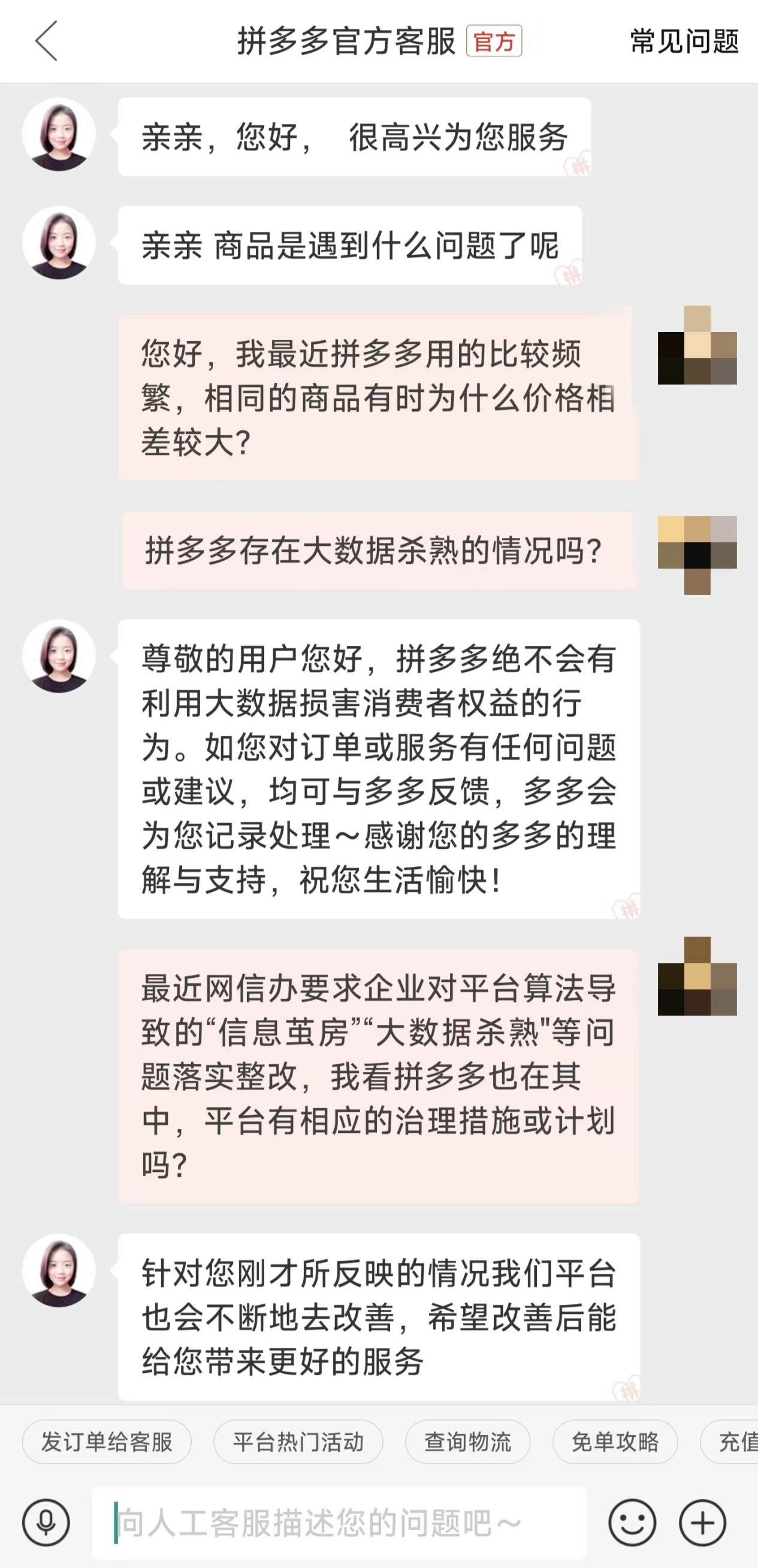
Furthermore, platforms such as Ctrip, Bilibili, and Eleme have also announced announcements on the governance of platform algorithm issues, advocating for supervision by users and institutions.
02 Some Platforms Have Not Made Clear Measures for Algorithm Governance: Baidu Refers to Statements, Didi Denies Price Discrimination
For internet platforms that have not publicly responded to algorithm rectification, Xinshi Research Institute attempted to contact the relevant companies.
Customer service at Baidu, a leading company in large model technology, stated that for related questions, please refer to the "Baidu Disclaimer" and "Baidu Privacy Protection Statement," which contain clear explanations. According to Baidu's official explanation, the content or stance searched by users on the platform does not represent Baidu's opinion, and the platform will seek consent in advance, with users bearing the risks themselves.
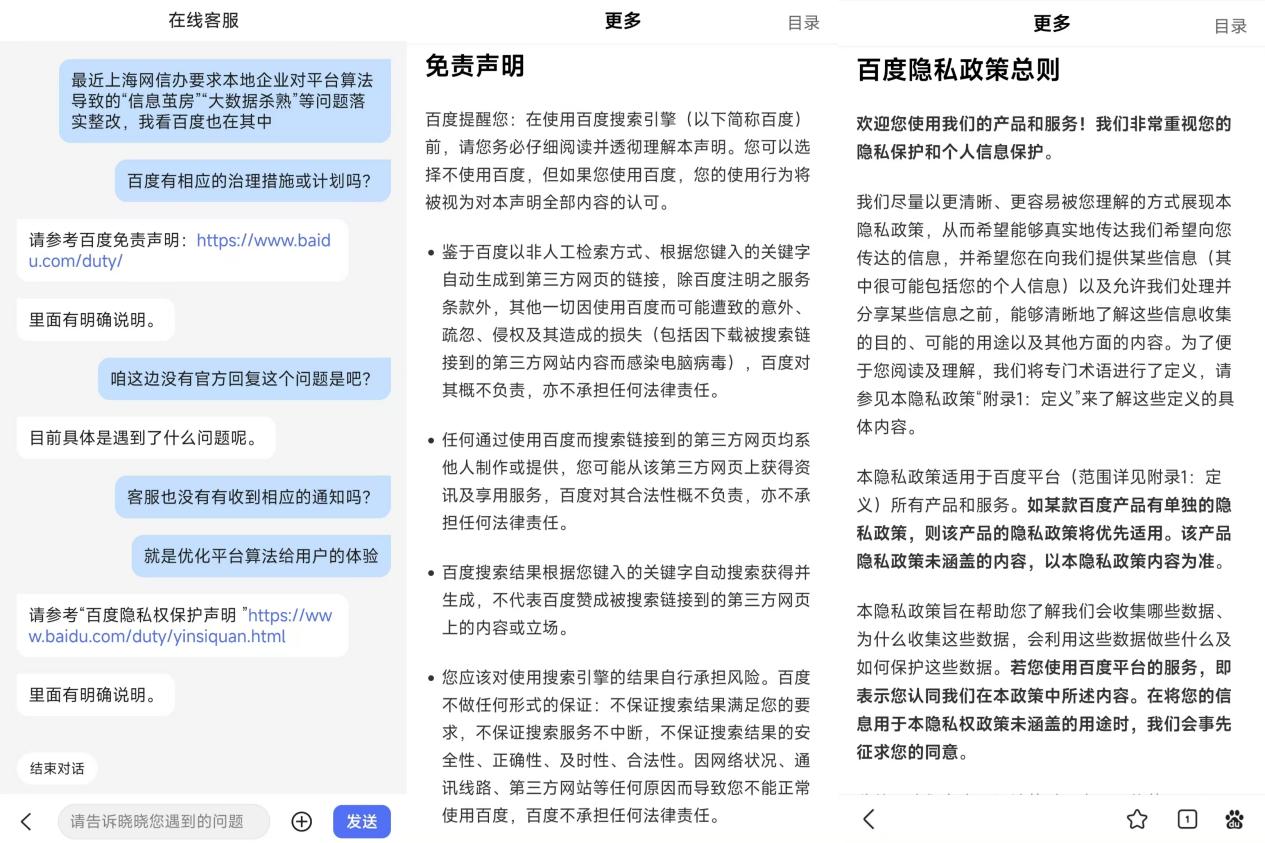
Regarding the big data price discrimination behavior reported by netizens, Didi Express customer service stated, "Didi has never had and will never have so-called price discrimination behaviors such as exploiting familiar or wealthy customers. The difference in taxi prices is based on real-time traffic conditions, and the issuance of coupons is based on platform activities."

Regarding algorithm issues, as early as September 2017, People's Daily conducted a "three-part commentary" on algorithm recommendations, pointing out that "algorithms also have values" and believing that algorithms should not determine content. Algorithm recommendations may trap users in "information silos," necessitating vigilance against algorithms hindering innovation and other issues.
Zhang Chenghong, a professor in the Department of Information Management and Business Intelligence at Fudan University School of Management, once wrote an article analyzing the necessity of governing algorithm chaos, stating that "when the results of algorithm decision-making or application harm the rights and interests of specific subjects, due to unclear rules and principles, there may be a risk of insufficient relief for interests; abuse or misuse of algorithms is also a potential risk, and the decision-making effects produced by algorithms may undermine social justice and social cohesion. Therefore, there is an urgent need for the industry to effectively govern AI algorithms."
As for how to specifically govern the chaos of platform algorithms, lawyer Zhu Xiaoyang, who participated in the case of Ms. Hu suing the Ctrip platform, the "first case of big data price discrimination," believes that "collecting and using personal information unrelated to the services provided, refining consumer personas, and discriminating against consumers in terms of prices exceeds the legal scope. Enterprises must provide sufficient evidence to prove that the design and operation of their algorithms comply with personal information protection requirements and the fairness and transparency of algorithms."
Industry progress not only requires enterprises to master cutting-edge "black technology" but also to prioritize the "traffic lights" of rules.
Amidst the rigorous scrutiny of national policies and the fresh challenge of "exams" for major platforms, this algorithm governance initiative is not a clash between enterprises and the public, but rather a chance for a collective of internet platform companies to proactively realign the values underpinning their products.






